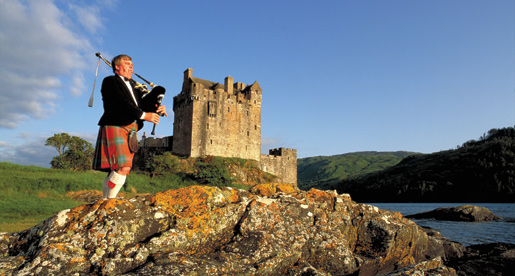We very nearly woke up in a different world, kids. You no doubt already know that the Scottish vote for independence came down on the side of remaining part of the United Kingdom, but it was pretty close, only 55% to 45%, and at certain times during the evening, it looked like it was going to be even tighter.
While the notion of a free and independent Scotland has some romantic appeal for me, I’m not unhappy about the way this turned out. I’ll confess that I’m not terribly well-informed on the independence movement, but much of the rhetoric I personally saw in the days leading up to this referendum, both pro and con, struck me as more emotional than rational arguments, and I found that troubling. Secession isn’t something to be taken lightly, and I’m the sort who always wonders what the unintentional consequences of something this major might be. Local actions have global consequences; if Scotland had broken away from its centuries-old union, would that have established a precedent for other separatist movements throughout Europe? Who would’ve been next? Catalonia, maybe? Northern Italy? And what of the secessionist feelings here in the U.S.? If it’s all right for Scotland to break away, then why not the former Confederate states? Or the Republic of Texas? How about the so-called “Mormon corridor” that roughly corresponds to Brigham Young’s original vision of a massive state called Deseret? Granted, I have occasionally grumbled after a particularly head-smacking political folly that breaks along regional lines that we might have been better off if Lincoln had just let the South go… but would we really? Does anyone actually believe we’re not stronger together than we would be as a loose aggregate of many small nations?
I suppose this gets into my basic political inclinations — I don’t believe that smaller government is always better, and I am greatly troubled by the resurgence in recent years of tribalism, regionalism, and nationalism right at a point in human history where we need to be coming together to confront some really big issues — as well as my tendency to resist change in general. I may be a social liberal, but I’m very conservative in that regard. Guess I wouldn’t make much of a revolutionary; if I’d been around 200 years ago, I probably would’ve been a Tory, just because I’m uncomfortable with shaking up the status quo too much.
And there’s something else to consider about the Scotland situation… what if it had been a “yes” vote with a margin that close? Would secession have been moral and ethical without more of an overwhelming majority in favor? What would happen to the half of the population who didn’t want to go it alone? Would they have felt compelled to leave their homeland? And how unfair would that have been?
For that matter, what happens now? Has this issue opened — or at least exposed — a rift in the Scottish population? Will it lead to some kind of partisan dysfunction like the clusterfarg here in the U.S.?
I don’t know, I’m just spitballing here, the way I always do. Running scenarios in my mind. In the end, I honesty don’t have terribly strong feelings on the matter one way or the other. I’ve long wanted to visit Scotland and I feel a certain affinity for the place (largely generated through movies I have enjoyed), but when it comes right down to it, I’m not Scottish and I don’t have Scottish ancestry, so I can’t make any claims of having a dog in this race. But it is something to talk about, I suppose…


